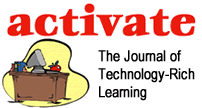Fall 2002 (volume 2, number 4)
 Lessons
from the Lizards: The Art of Adaptation in a Technology-Rich
World
Lessons
from the Lizards: The Art of Adaptation in a Technology-Rich
World
Like the reptiles, teachers must learn to adapt. There's just no time to develop new materials to meet the ever-changing standards. Instead, locate materials online, adapt existing resources, and transform activities by focusing on critical and creative thinking.
This session demonstrates how to adapt the content, process, product, and evaluation elements of technology-rich lessons to build an effective learning environment in all content areas. From camouflage to replication, apply practical strategies of adaptation to explore, expand, and enhance existing teaching materials. Learn More...
 Avoiding
Deja Vu: A Diet of Technology Trends that Work
Avoiding
Deja Vu: A Diet of Technology Trends that Work
Haven't we done this before? Technologies, innovations, standards, and educational strategies... we're constantly bombarded by new and recycled information and opportunities. We can't do everything.
Like finding the right diet, we need to make good choices that will have a lasting, positive impact on teaching and learning. Rather than filling up on "junk food" technology, let's make fundamental changes in how we view technology in the learning environment. This session will provide specific strategies for matching the best of traditional approaches with innovations that work. Learn More...


 Extreme
Thinking:
Extreme
Thinking: